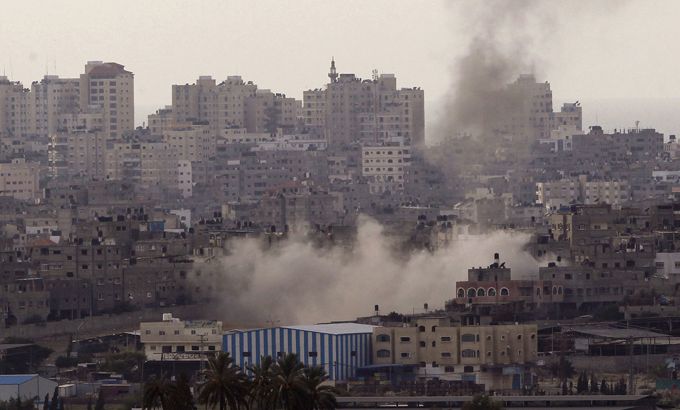Egypt PM decries Israeli ‘aggression’ on Gaza
Hesham Qandil, on a brief visit to the Palestinian enclave, says Cairo will try to secure a ceasefire.

On a brief visit to the Gaza Strip, Egyptian Prime Minister Hesham Qandil has denounced Israel’s attacks on the Palestinian territory and said Cairo would try to secure a ceasefire.
“Egypt will spare no effort … to stop the aggression and to achieve a truce,” Qandil said as he visited wounded residents at a Gaza hospital on Friday.
Fighting reportedly continued along the Israel-Gaza border during Qandil’s three-hour visit, despite Israel announcing it would hold its fire while Qandil was in the enclave on the condition that Hamas fighters did the same.
Hamas said strikes on Friday morning killed three Palestinians, including a child. One more person was reported killed later in the day.
Israel’s military denied it had carried out attacks during the temporary cessation, but said about 50 rockets were fired from Gaza while Qandil was in the Palestinian territory.
Egypt, now led by an Islamist government seen as ideologically close to Hamas, has arranged previous informal truces between Israel and Palestinian groups in the Gaza Strip.
EU foreign policy chief Catherine Ashton expressed hope that Qandil “will be able calm the situation”.
“Israel has the right to protect its population from these kinds of attacks. I urge Israel to ensure that its response is proportionate,” she also said.
In a major escalation by Gaza fighters, rockets launched from the enclave landed near the Israeli cities of Tel Aviv and Jerusalem on Thursday and Friday without causing any casualties.
The Israeli army said it had carried out 466 air strikes since it launched “Operation Pillar of Defence” on Wednesday afternoon with the targeted killing of Hamas commander Ahmed Jabari .
Israel says its offensive is a response to increasing missile attacks from Gaza. The army said at least 280 rockets had been fired from Gaza at Israel since Wednesday afternoon.
Three days of Israeli air strikes have killed 28 Palestinians, including at least 11 civilians, according to Palestinian officials. A rocket fired from Gaza killed three Israelis in the town of Kiryat Malachi on Thursday morning.
Egypt condemnation
Egypt’s new Islamist president, Mohamed Morsi, viewed by Hamas as a protector, denounced Israel’s attacks as “a blatant aggression against humanity”.
“I tell them in the name of all the Egyptian people that the Egypt of today is not the Egypt of yesterday and that the Arabs of today are different than the Arabs of yesterday,” he said after weekly Muslim prayers at a Cairo mosque.
“Cairo will not leave Gaza on its own.”
Morsi faces domestic pressure to act tough. But Egypt gets $1.3bn a year in US military aid and looks to Washington for help with its ailing economy, constraining Morsi despite his need to show Egyptians that his policies differ from those of his US-backed predecessor, Hosni Mubarak.
Speaking from Gaza, Hamas leader Ismail Haniyeh urged Egypt to do more to help the Palestinians.
“We call upon the brothers in Egypt to take the measures that will deter this enemy,” the Hamas prime minister said.
The resurgent conflict will be the biggest test yet of Morsi’s commitment to Egypt’s 1979 peace treaty with Israel,
which the West views as the bedrock of Middle East peace.
Cairo recalled its ambassador from Israel on Wednesday. Israel’s ambassador left Cairo on what was called a routine home visit. Israel said its embassy would remain open.
Protests
The Muslim Brotherhood, which brought Morsi to power in an election after the downfall of former President Hosni Mubarak, has called for a “Day of Rage” in Arab capitals on Friday.
Thousands gathered in Egyptian cities to protest, including at the ancient mosque of al-Azhar in Cairo.
Thousands also marched in Lebanon’s biggest Palestinian refugee camp, Ain el-Hilweh, and in the country’s capital.
|
|
| Al Jazeera speaks to Mark Regev, Israeli government spokesman |
Tunisia’s foreign minister will visit Gaza on Saturday as part of a delegation to offer support to Hamas and increase Arab pressure on Israel.
UN diplomats also said Secretary-General Ban Ki-moon would head to Israel and Egypt next week to try to mediate a ceasefire, although they gave no further details.
The United States has asked countries that have contact with Hamas, such as Egypt and Turkey, to urge the movement to stop its recent rocket attacks from Gaza, a White House adviser said.
US Defence Secretary Leon Panetta said in an interview with Voice of America: “I understand the reasons Israel is doing what they’re doing. They’ve been the target of missiles coming in from Gaza.”
He added, “Our hope is that in striking back that they can minimise the civilian deaths that are likely to occur.”
British Prime Minister David Cameron spoke to the Israeli PM, saying Hamas bore the principal responsibility for the crisis.
Iran, which has backed Hamas against Israel, condemned the military offensive as “organised terrorism”.